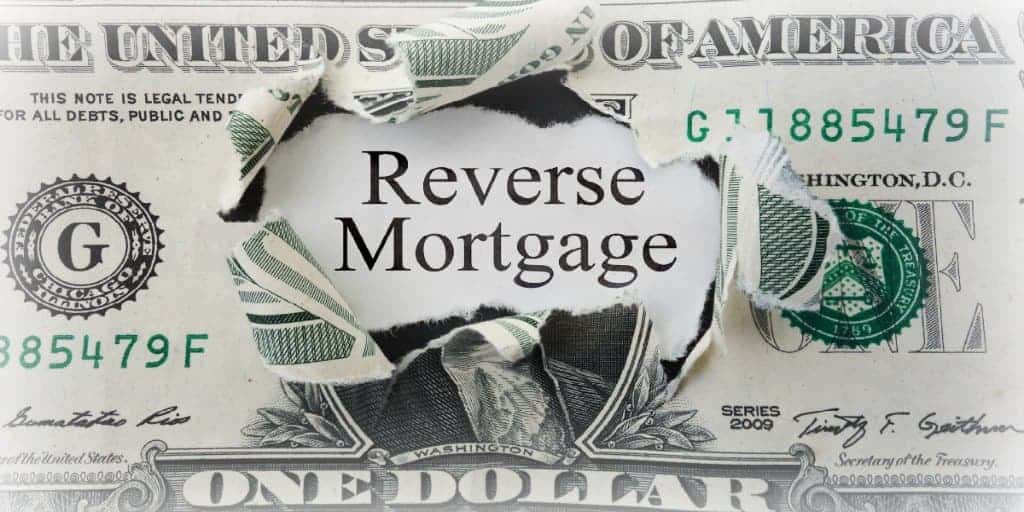What is a Reverse Mortgage and Should I Get One?
(This page may contain affiliate links and we may earn fees from qualifying purchases at no additional cost to you. See our Disclosure for more info.)
Financing your retirement is no easy feat. You’ll need enough money to cover your regular expenses, your hobbies, and potentially significantly increased medical costs.
If you’re worried about funding your golden years and you own a home (either free and clear or with a small mortgage balance), a reverse mortgage could help alleviate your stress.
A reverse mortgage is exactly how it sounds. If you’re age 62 or older, a lender will make payments (monthly or lump sum) to you based on the equity in your home.
But make no mistake — this is a loan, using your home equity as collateral.
While this loan could make a positive impact on your life now, you may end up leaving less to your heirs than you’d like since it will ultimately need to be repaid.
Let’s explore some of the nuances of a reverse mortgage so you can gauge if it might be right for you.
Types of Reverse Mortgages
According to the Federal Trade Commission (FTC), there are three main types of reverse mortgages:
- Single Purpose: State/local governments or non-profits provide these loans, but there can be limits on availability. Funds can only be used for one predetermined purpose, such as home repair.
- This can be a good route for you if your income is low, as the cost to borrow is less than other reverse mortgage options.
- Proprietary: Loans are made by private firms. Funds can be used for any purpose.
- This option is designed for those with high-value homes and is often referred to as a jumbo reverse mortgage.
- Home Equity Conversion Mortgage (HECM): Loans are made by the Department of Housing and Urban Development (HUD). To qualify, the value of your home cannot exceed $726,525. You can use funds for any purpose. HECMs offer more flexible payment options than proprietary loans that typically only issue lump sums.
- This is by far the most common reverse mortgage type.
Getting a Reverse Mortgage
Obtaining a reverse mortgage will feel similar to receiving a standard mortgage. First, you need to select the type that would work best for you. As with any loan, you should shop around for the best deal.
Then, you apply for the loan, where your financial health will be assessed. Lenders will also need to see you’re current on your property taxes and homeowner’s insurance bills.
Additionally, for HECM loans, lenders need to verify your home meets FHA property standards. Finally, you may be required to complete reverse mortgage counseling to ensure you fully understand the loan.
If everything checks out, you’ll pay: fees to start the loan, closing costs, and expenses to maintain the loan.
If you get a HECM, you’ll also have to pay mortgage insurance. You can roll some of these costs into your loan so the initial hit to your checkbook won’t be as bad (though it may cause you to have access to fewer funds).
While you’ll have to pay upfront costs associated with the loan, you (or your heirs) won’t have to repay the loan itself until you die, move, or sell the home.
How Much Can I Borrow?
That depends on some factors like your age, which reverse mortgage type you opt for, how much equity you have in your home, interest rates, and your overall financial health.
In general, older folks with more equity can take out larger loans.
Tip: There are many calculators available that give you an idea of how much a reverse mortgage could get you.
Perks of a Reverse Mortgage
There are a number of reasons a reverse mortgage may appeal to you:
- You still own the home.
- You don’t have to pay taxes on the payments you receive.
- Payments usually won’t impact your Social Security or Medicare.
- Typically, the loan doesn’t have a defined due date — as long as you live in the home.
Pitfalls of a Reverse Mortgage
While there are some positives to getting a reverse mortgage, there are also some negatives to be aware of:
- If you or your heirs cannot come up with the money to repay the loan, you’ll/they’ll have to sell the house to satisfy the lender.*
- The interest on the loan will cause the loan balance to grow over time.
- Some reverse mortgages have variable interest rates, making it tough to predict what the ultimate liability will be.
- If you fall behind on home maintenance, insurance, or property taxes, the lender could require you to repay the loan prematurely.
- If you take out the loan in your name only and you die or otherwise permanently leave the home, your spouse/partner may have to repay the loan or move out soon after you’re gone (and vice versa!).
*The good news? You can’t owe more than what your home is worth.
What Should I Consider?
As you weigh out whether a reverse mortgage is right for you, think about:
- How much money you need and what you need the money for (If you want to live off of the proceeds, then the single purpose reverse mortgage won’t work.)
- How long you plan to live in the home (If you’re not planning to be in the house long, taking out the loan may not be financially prudent.)
- If the loan could be repaid (If you want to leave the property to heirs, can they repay the loan so they can keep it?)
Alternatives
If you have reservations about getting a reverse mortgage, there are other options available to improve your cash flow:
- Cash-out refinance. It’s cheaper to obtain a cash-out mortgage refinance and one allows you to keep building equity (where the reverse mortgage drains your equity). However, you’ll need to make monthly payments or risk foreclosure.
- A home equity line of credit (HELOC). This option also has fewer fees than a reverse mortgage and allows you to tap into funding whenever you need it. During the draw period, you only need to pay the interest on the loan. However, be prepared for the payment to jump once the draw period is over. Additionally, if your home value drops, the HELOC can be canceled. And, if you miss payments, you can face foreclosure.
- A home equity loan. This option gives you a lump sum at a lower interest rate than a reverse mortgage. However, it is more expensive than a HELOC and still requires you to make faithful monthly payments to avoid foreclosure.
- Sell the home. You can use the proceeds to buy a less expensive house in full, keeping anything leftover as a cash reserve. If you want your family to have the home when you pass, you could sell it to them ahead of time.
- Rent out a room. While dealing with tenants has its issues, renting out part of your home may help you cover any shortfalls in your budget.
- Declare bankruptcy. While this option mars your credit, it can help you get your debt under control, which ultimately improves your budget.
Final Thoughts on Reverse Mortgages
Obtaining a reverse mortgage could be an appropriate solution if you really need an income stream and are short on other options.
Additionally, if you have no plans to leave your home to a loved one, it could be a great way to augment your retirement lifestyle.
However, if you do have other options and want to bequeath the home to an heir, a reverse mortgage may not be a good fit for your situation.
Deciding to obtain a reverse mortgage (and then actually getting it) is an incredibly nuanced process.
This article's intent is to provide general information only. You’re encouraged to have thorough and open dialogues with your family (if applicable) and trusted, qualified financial professionals for guidance.
Avoid high-pressure salespeople who over-promise the benefits and underemphasize the risks. And, be sure to understand precisely how your reverse mortgage will work both while you’re alive and after you’re gone before committing.
Article written by Laura


